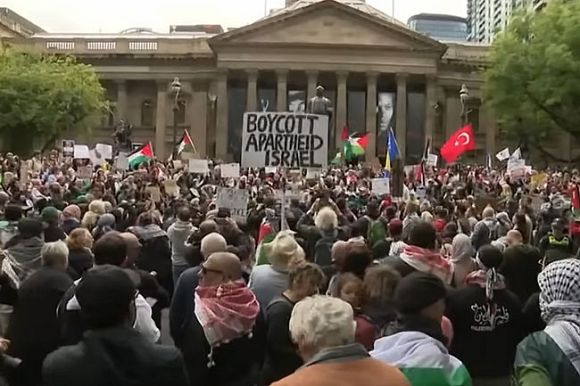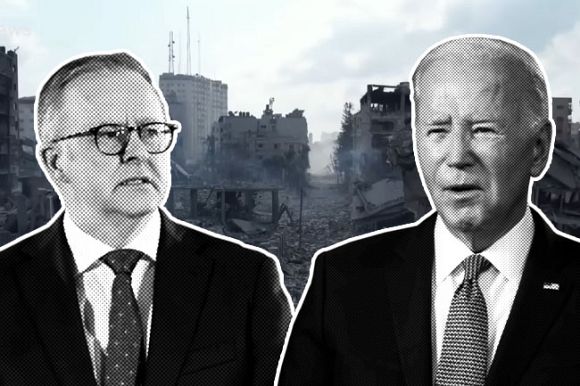The recent escalation of conflict in the Middle East is a reminder that after decades of aggression, peace in the region is difficult to achieve, writes Dr Lee Duffield.
THE 7 OCTOBER pogrom in Israel has edged the Middle East and even the wide world towards calamitous war — deserving of thought before we get swept into it.
Unlike the cruelty of past massacres of innocent Jewish people, over more than 1,000 years, this time there is a great army on hand to intervene and begin retribution.
Filling out the picture: The victims and their loved ones were Jewish, who shared a folk memory and in many cases, living memory of the Holocaust, pledging “never again”. As Israel began its pre-emptive defence in the 1967 Six-Day War, world news media picked up Palestinian radio broadcasts reiterating the idea of “driving them into the sea”. The savagery and cowardice of the attack on 7 October this year within the borders of Israel itself reignited fears of such an intention and what it might mean.
Retribution by the Israel Defence Force, detonating thousands of bombs in urban Gaza, is proclaimed as a drive for survival of the Jewish state and its 9.3 million people, seven million of those belonging to the Jewish faith. They want to destroy the Hamas movement which has dominated the Gaza territory and organised this month’s attack across the border. As if, to avenge a pogrom in the mediaeval epoch, a fortified castle was put under siege, but with the worst and most powerful modern-day munitions deployed.
While the transgressors are dug into the castle and there are the hostages who must be saved, the developing scenario starts to push the moral pendulum back against Israel.
The history of Gaza as a mass encampment, described very often as the world’s largest open-air prison, is known; more than two million have been living there under conditions of deprivation and fear, the exchanges between Hamas and Israel meaning a life under intermittent bombardment. The arguments about the situation go back and forth: Jews will say the Palestinians have been kept there by Arab states refusing to take them in; Arabs will say they have a full right to return to the land, taken by the Israelis in 1948.
The outcome has been deepening conflict and hardening of minds.
A bad complication came with a demographic shift in Israel, with migration from Russia and elsewhere outside from around 1970 that brought in supporters of the ultra-nationalist and religious Right wing. Over time, a coinciding militarisation in the Arab world provided fertile ground for fresh embitterment and radicalisation to support this movement in Israel.
Israeli governments signed on for violent “outcomes” of their own. Sharing the responsibility with terrorists taking over on the Arab side, they ended international attempts to broker a peace accord and “two-state” solution — Israel and Palestine. They promoted the encroachment of militant Israeli settlers into the West Bank region and for a time, even into Gaza.
The tone of it was represented by Israeli ministers this time, reportedly vowing, if correctly quoted, not only to “end Hamas” but also cut down the size of the Gaza enclave and “end responsibility” for it, until this date meaning both control of access and provision of essential supplies.
Millions of Israelis have been engaged in mass protests against moves by the present radical government to abrogate long-standing principles of justice in the courts system. So many of those people now have had to join the military mobilisation, to respond to a serious national emergency, minded to try and save the country — ultimately dragged into an impossible situation by the “policies” of bigots and thugs in office.
The human catastrophe now unfolding in Gaza is destroying another people, who also have bitter living memories, and a nightmarish folk memory of defeat, dispossession and repression. After what is happening now, can it do anything but get worse?
I have a vivid recollection of the start of the last great effort at a reasonable settlement, witnessing the arrival of Yasser Arafat, leader of the secular Palestine Liberation Organisation, in Geneva in 1988 to make his famous declaration that acknowledged the right of Israel to exist: “We reject violence, we want our Palestinian state,” he intoned over and again. There was little enough trust on the ground. The Americans did not like the translation of his declaration in Arabic; he returned the next night to repeat it in English.
Later talks, into the 1990s, failed on whether Palestinians could re-enter Israel. Some thought that could be managed through visas and compensation; some feared a pogrom if they came in numbers, on the lines of what has happened in 2023. Arafat, under pressure from Islamists and other extremists moving against him, had endorsed the first Intifada (1987-1991), violent protests that took thousands of lives, mostly Palestinian. Hamas, which emerged from all that as the dominant force, has denied the right of Israel to exist.
Now we have the wholesale torture and slaughter of children, whether grabbed in the street and abused in person by egregious murderers – the German SS come back – or perishing in terror under the guns, caught up in a war of revenge and retribution.
While it is too obvious how civilians and families are affected in this scenario, how do they fit into the war of words? The 1960s anti-war song said the “universal soldier” really is to blame. Who voted for Prime Minister Benjamin Netanyahu, the radical Right-wing and fanatical religionists in Israel? Who in the Gaza community cultivated and harboured their sons and brothers of Hamas and wilfully followed their violent nostrums?
If there and traumatised so you cannot see any other pathway; if powerless anyway to stop their recklessness and violence; or intimidated into submission, which way to go? Help from outside offers a pathway for anger; if it is just military intervention and assistance, that will get a settlement for a while and can surely cultivate more war.
Or outside help offers a pathway for agreement; humanitarian relief, voices of reason that can still be heard. The United Nations presents a picture of desperation on how that is going, but it appears a last hope in a theatre of unbending conflict and the widening circle of violence.
Among his vast journalistic experience, Dr Lee Duffield has served as ABC's European correspondent. He is also an esteemed academic. He is a member of the Editorial Advisory Board of Pacific Journalism Review.
Related Articles
- Albanese Government urgently implored to help resolve Middle East crisis
- Backing Israel's rage-fuelled revenge presents moral dilemma
- Stop asking everyone to condemn Hamas
- Spotlight falls on Netanyahu amid destructive war in Israel and Gaza
- Albanese Government joins world leaders in condemning attacks on Israel
 This work is licensed under a Creative Commons Attribution-NonCommercial-NoDerivs 3.0 Australia License
This work is licensed under a Creative Commons Attribution-NonCommercial-NoDerivs 3.0 Australia License
Support independent journalism Subscribe to IA.















